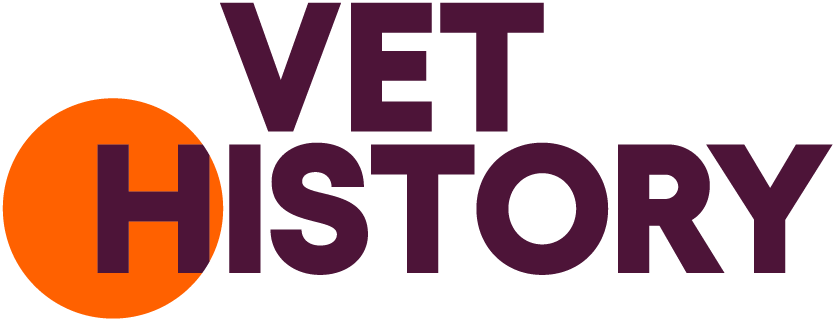12 – Letter to Fred Bullock from Frederick Smith, 11 Feb 1923
The copyright of this material belongs to the Royal College of Veterinary Surgeons. It is available for reuse under a Creative Commons, Attribution, Non-commercial license.
Help more people find this work! Suggest a tag via the form:
Help more people find this work! Suggest a tag via the form:
Help more people find this work! Suggest a tag via the form:
Help more people find this work! Suggest a tag via the form:
[Please note: Due to the high number of responses to this call for volunteers, we are currently unable to accept any more people onto the project. We hope to expand the project in the future, so please keep an eye on this blog for further opportunities.]
The Vet History team have been quiet on this blog for a while, but have been very busy behind the scenes with cataloguing and digitisation. Now that we are all working from home, and temporarily physically separated from our beloved historical collections, expect to hear from us more often!
First of all – a call for volunteers!
If you are interested in improving your reading of nineteenth century handwriting (or making a start!) then we want to hear from you!
Last year we digitised a large volume of letters written in 1840 in support of a petition (or memorial) calling for reformation of the teaching and examination of students at the Royal Veterinary College in London. This huge wave of support from over 200 veterinary surgeons across the country paved the way for the formation of the RCVS, and their being granted a Royal Charter in 1844.
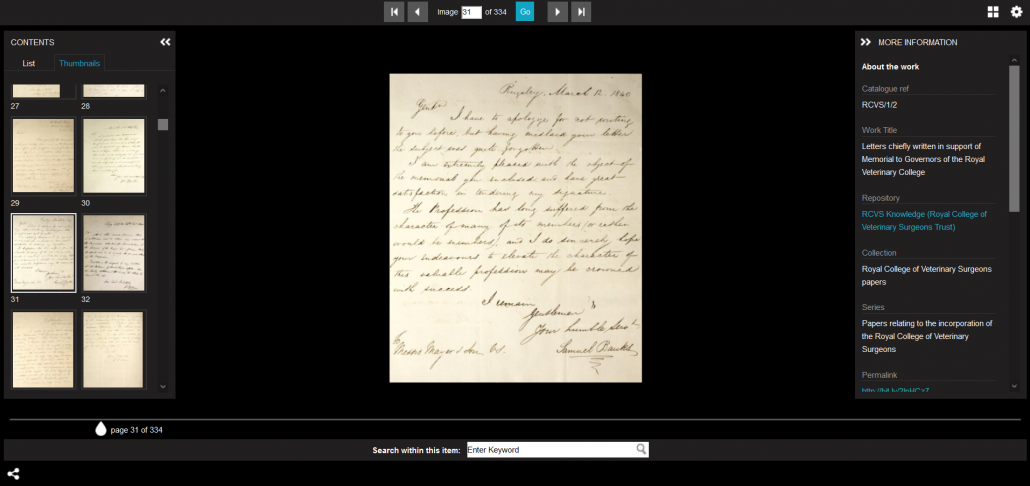
A screenshot of the digitised letters written in support of Memorial to Governors of the Royal Veterinary College [RCVS/1/2]
Although everyone can now freely access these digitised letters on the Vet History website – they would be even more accessible if they were individually transcribed. We would love our audience to get involved, and also satisfy anyone who is hungry for some historical documents or to gain new research skills whilst self-isolating!
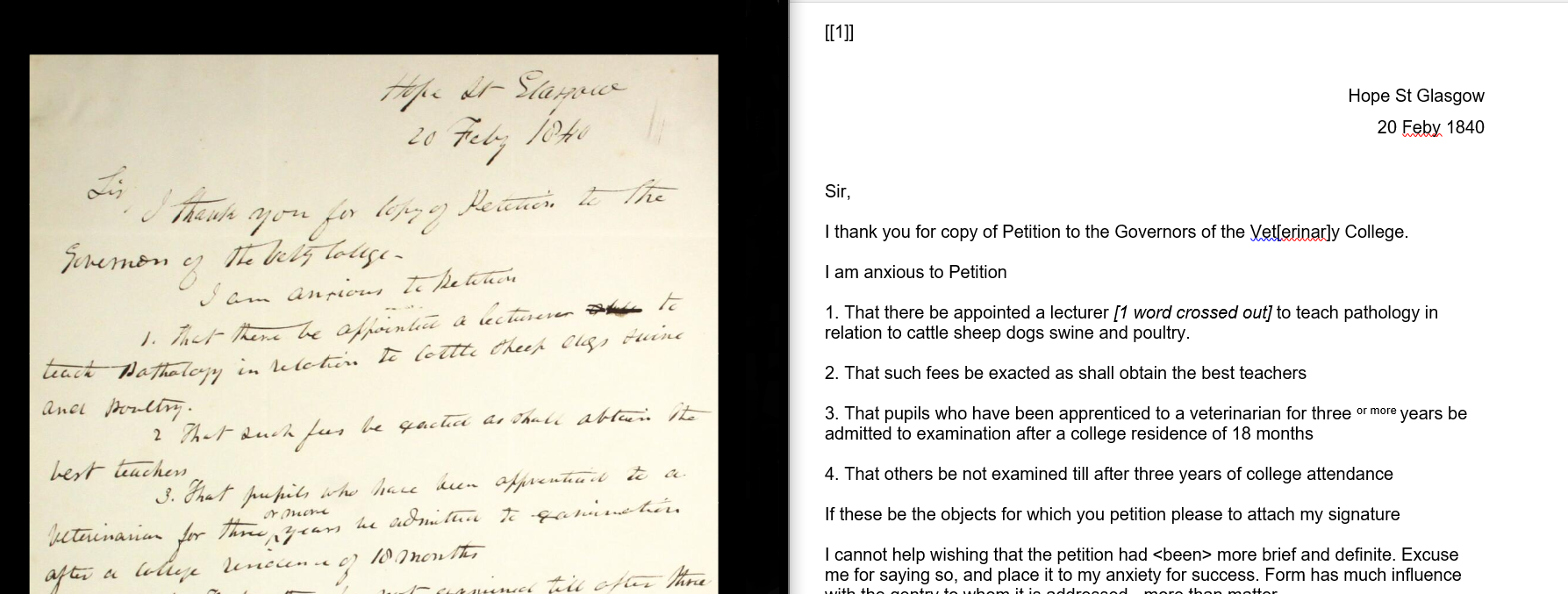
Digitised letter from J Stewart of Glasgow, beside a transcription of the letter.
Volunteers will be assigned individual letters to transcribe, and be provided with guidance documents for how to set out transcriptions, and support with interpreting tricky handwriting.
Completed transcriptions will be added to the Vet History website, and transcribers will be credited (with permission).
Please contact us via archives@rcvsknowledge.org if you would like to take part.
–Lorna–

Screenshot of digitised and transcribed version of Coleman’s introductory lecture, on the Digital Collections website
Two hundred years ago today – which was a Monday not a Friday – students attended the Introductory Lecture of the 1821/1822 session at the London Veterinary College, now known as the Royal Veterinary College.
The lecture was delivered by Edward Coleman, Professor of the College, and thanks to notes of the lecture taken by student Edmund Gabriel, we can know exactly what he taught.
Gabriel’s notes from this lecture, and over 70 others, are held in our collections and are now being digitised, transcribed, and made available to all via our Digital Collections.

Plaster bust of Edward Coleman, on display in the Members’ Room at the Royal College of Veterinary Surgeons
Edward Coleman (1766-1839) was a medical surgeon, with no veterinary training, who became head of the veterinary school in 1794, and Principal Veterinary Surgeon to the Army in 1796. He held both posts until his death in 1839. After the sudden death of the College’s first Professor, Charles Vial de St Bel, in 1793, Edward Coleman and William Moorcroft were jointly appointed to rescue the fledgling institution, which was mired in financial difficulties. Moorcroft resigned after only a few weeks, possibly due to a desire to focus on his private practice, or due to conflict with Coleman.
Reports of Coleman describe him as ‘mercurial’, but an intelligent man, and a gifted teacher. However, Frederick Smith, one of his severest critics, complained that his lack of veterinary experience, and fierce resistance to change, impeded the progress of the veterinary profession for decades. What is certain is that Coleman dominated the veterinary sphere in Britain for over 40 years, and greatly contributed to the growth of the profession in the early 19th century. Growth that would eventually lead to its reform and the creation of the Royal College of Veterinary Surgeons.
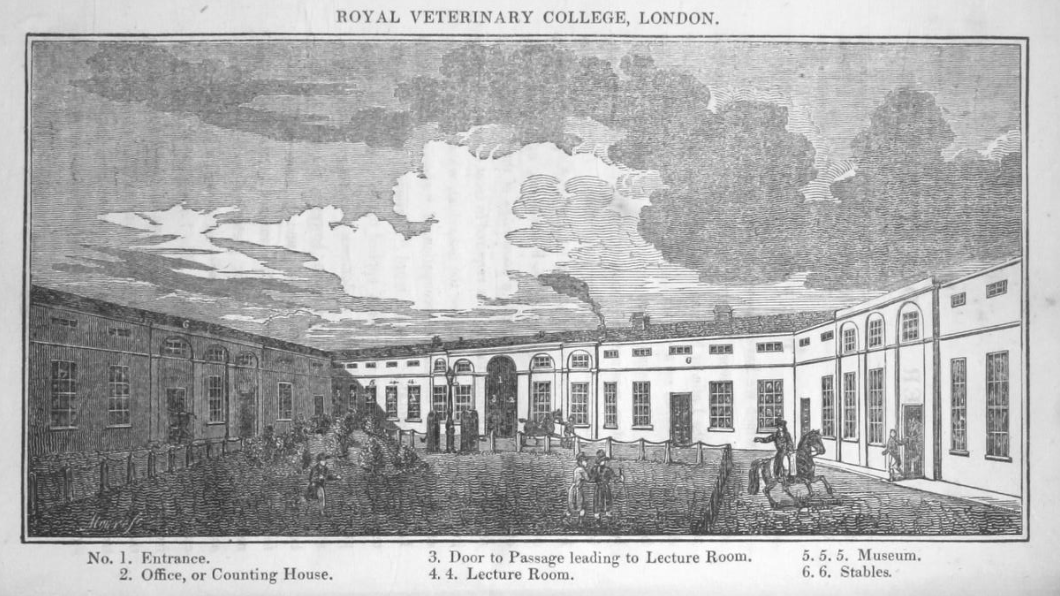
Engraving of the Royal Veterinary College, published in The Farrier and Naturalist journal, January 1828
St Bel’s original plan for the College was a 3-year course, for boarding students, with an admission fee of 20 guineas (equivalent to around £1700 today). During Coleman’s time, the course length was eventually reduced to as little as 3 to 4 months, with the expectation that students would also attend lectures on comparative anatomy and pathology at medical schools.
Students could then attend a viva voce examination by a board of prominent medical men, held quarterly at the Freemason’s Tavern. We know of at least 15 men who passed their examination in 1822, including Edmund Gabriel, the scribe of this collection of lecture notes.
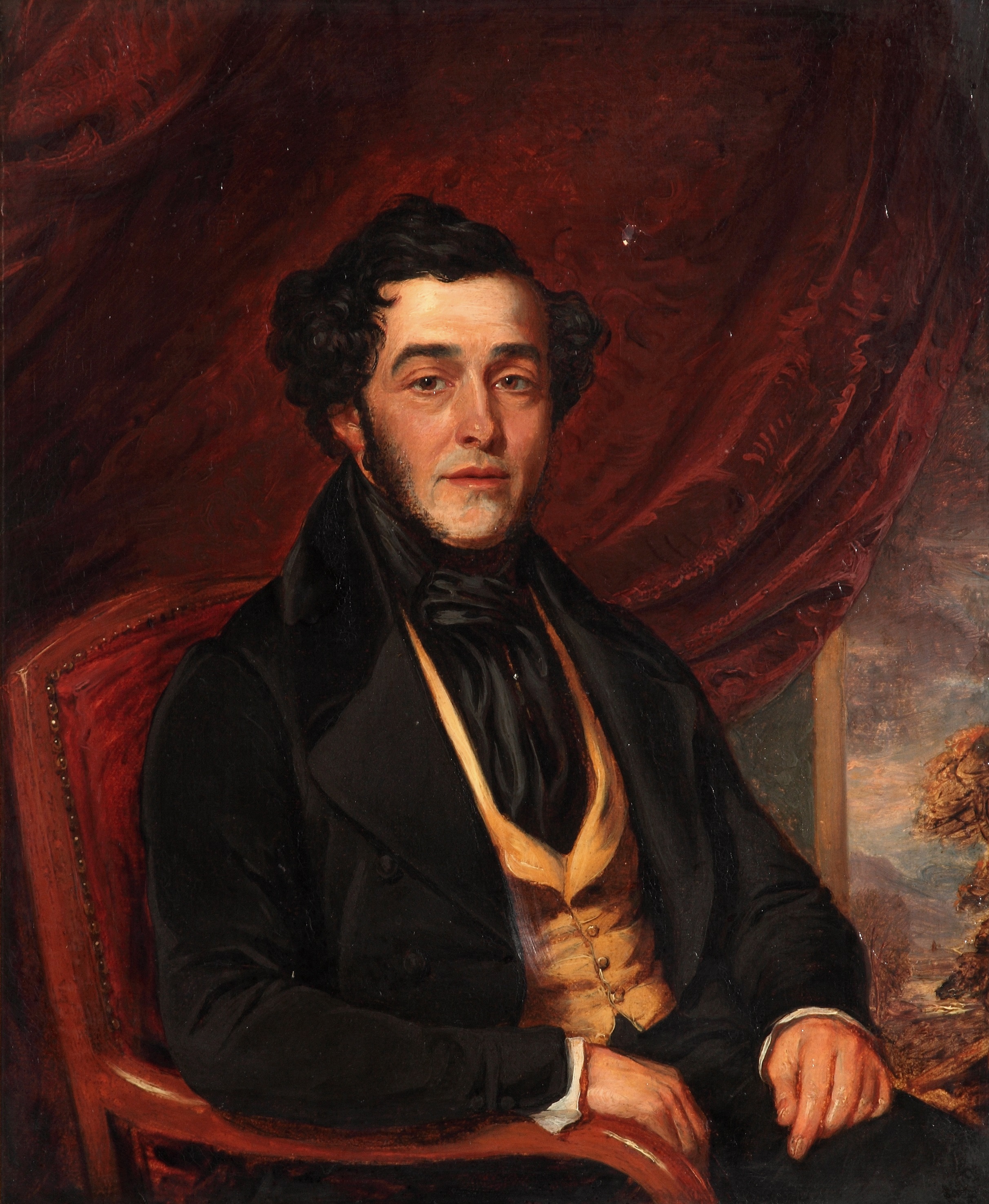
Portrait of Edmund Gabriel, donated to the RCVS in 1883
After graduating, Edmund Gabriel (1800-1864), seems to have remained in London, with his address listed as Fetter Lane, off Fleet Street. Later, in 1844, he became the first Secretary of the Royal College of Veterinary Surgeons, where his distinctive sloping handwriting can be seen in the first book of Minutes of the Council.
When the RCVS first moved into 10 Red Lion Square in 1853, Gabriel resided there for a portion of his annual honorarium. In 1856, he was elected veterinary surgeon for the RSPCA. He remained Secretary until ill-health forced his resignation in 1861, and died in 1864. His obituary in The Veterinarian describes him as “active and energetic in mind, gentlemanly in his demeanour… and was respected most by those who knew him best.”

Screenshot of first page of Lecture 9 – Structure, ecomony and diseases of the bones.
Gabriel’s notes comprise of 77 lectures, delivered from the 12th November 1821 to 19th June 1822. They almost completely relate to horses only, with the occasional mention of other species as a point of comparison. Most comparisons are made between equine and human anatomy and pathology, which is perhaps unsurprising, due to Coleman’s medical background, and the assumed medical experience of many of the students.
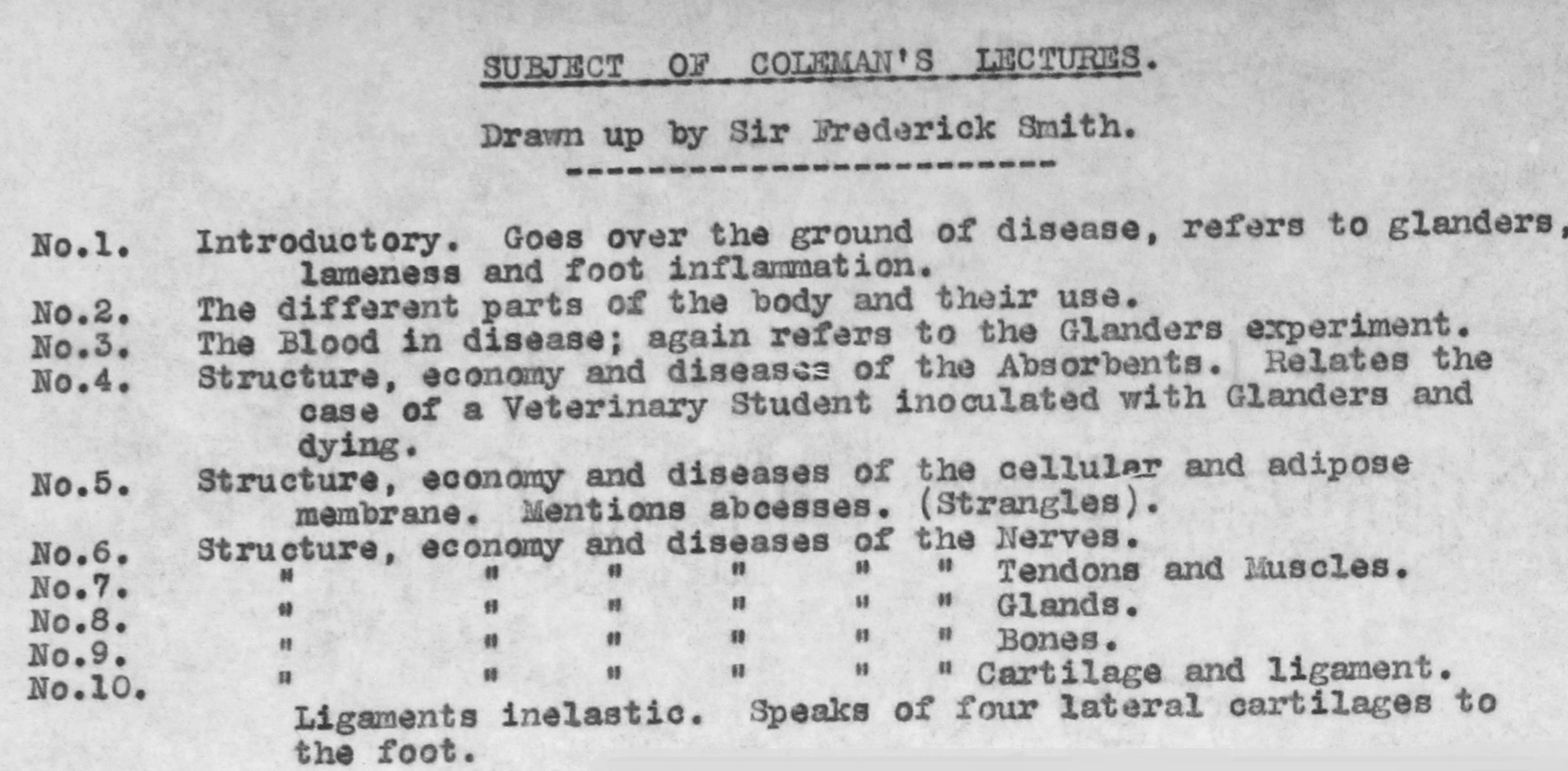
Extract from Frederick Smith’s list of subjects of Coleman’s Lectures
The lectures provide a fascinating snapshot of veterinary education, and general scientific knowledge, at the time. This was 10 years before Darwin sailed on HMS Beagle, and before the term ‘scientist’ was coined by William Whewell. Coleman taught that everything that happened in the body was for a purpose, even if that purpose could not yet be observed. The lectures include frequent mentions of trials and experiments carried out and the conclusions that are drawn from the results. For example, in Lecture 3, which relates to blood, Coleman speculates as to the cause of coagulation. At this stage, science is aware of red blood cells, but this was still the early days of microscopy, and it would not be possible to view platelets until higher-resolution microscopes were developed several years later. Similarly, in Lecture 4, Coleman says of glands:
“We know but little of their functions but those must be either something added or abstracted, we cannot suppose they should enter them for nothing, why do they go through them at all unless for some particular purpose”
The discovery of hormones and a wider understanding of endocrinology would arrive several decades in the future.
As well as digitising all these lectures to add to the Digital Collections, we have begun the lengthy process of fully transcribing the text to make them even more accessible. Several volunteers who contributed to last year’s transcription project have gamely agreed to tackle Gabriel’s handwriting and lend their experience and veterinary expertise to help decipher more obscure anatomical terms that are a mystery to me!
Twenty of the lectures are uploaded already, and so far, five of them have transcriptions available. More will be added in the coming months – so watch this space!
-Lorna-
We are an RCVS Knowledge initiative, for the preservation and promotion of the historical collections of the Royal College of Veterinary Surgeons, made possible with the support of The Alborada Trust.
The Alborada Trust is a charitable trust founded in 2001. Its aims are the funding of medical and veterinary causes, research and education – and the relief of poverty and human and animal suffering, sickness and ill-health. Charity Registration No 1091660
Royal College of Veterinary Surgeons Trust (trading as RCVS Knowledge) is a registered Charity No. 230886. Registered as a Company limited by guarantee in England and Wales No. 598443.
Registered Office:
First Floor, 10 Queen Street Place, London EC4R 1BE
Correspondence Address:
RCVS Knowledge, 3 Waterhouse Square, 138-142 Holborn, London. EC1N 2SW
020 7202 0721
This site uses cookies. By continuing to browse the site, you are agreeing to our use of cookies. See our cookie declaration
Accept settingsHide notification onlySettingsWe may request cookies to be set on your device. We use cookies to let us know when you visit our websites, how you interact with us, to enrich your user experience, and to customize your relationship with our website.
Click on the different category headings to find out more. You can also change some of your preferences. Note that blocking some types of cookies may impact your experience on our websites and the services we are able to offer.
These cookies are strictly necessary to provide you with services available through our website and to use some of its features.
Because these cookies are strictly necessary to deliver the website, refuseing them will have impact how our site functions. You always can block or delete cookies by changing your browser settings and force blocking all cookies on this website. But this will always prompt you to accept/refuse cookies when revisiting our site.
We fully respect if you want to refuse cookies but to avoid asking you again and again kindly allow us to store a cookie for that. You are free to opt out any time or opt in for other cookies to get a better experience. If you refuse cookies we will remove all set cookies in our domain.
We provide you with a list of stored cookies on your computer in our domain so you can check what we stored. Due to security reasons we are not able to show or modify cookies from other domains. You can check these in your browser security settings.
We also use different external services like Google Webfonts, Google Maps, and external Video providers. Since these providers may collect personal data like your IP address we allow you to block them here. Please be aware that this might heavily reduce the functionality and appearance of our site. Changes will take effect once you reload the page.
Google Webfont Settings:
Google Map Settings:
Vimeo and Youtube video embeds:
